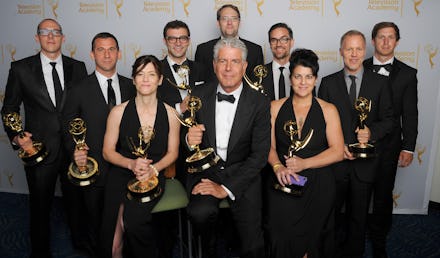What was it like to work with Anthony Bourdain? The ‘Parts Unknown’ crew spills in special episode.

On Sunday’s special episode of Parts Unknown, titled “Behind the Scenes,” the show’s crew members reflect on their journey throughout 12 seasons of adventure with host Anthony Bourdain. The episode is bittersweet, but mostly outlandishly funny. Viewers get to see several clips of an unedited Bourdain, a beloved friend to his editors, shooters and producers who seemed to work just as hard at making his staff crack up as he did at sharing the tastes, perspectives and rituals of different cultures around the world.
If you’ve ever wondered what it would have been like to work with Bourdain, the CNN special offers rare insight into life on the road with the master storyteller. Below are a few of few of the lessons shared.
Was Bourdain nice?
If you’ve ever met a celebrity, one of the first things you might later be asked about the experience is whether the famous person was “nice.” Those interviewed on this Parts Unknown episode had a lot to say about the show’s protagonist, but “nice” wasn’t one of the adjectives used.
Bourdain was described as a “curmudgeonly funny dude,” “candid,” “raw,” “difficult” and “brilliant.”
“Only pet the baby when it’s sleeping.” This was reportedly the ideology Bourdain embraced in his treatment of his crew members, many of whom quoted the line in the episode. At one moment, journalist Bill Buford is talking with Bourdain about how prepared and talented his crew is.
“Only pet the baby when it’s sleeping,” Bourdain said through a smile.
Was it easy to work with Bourdain?
Throughout the episode, the crew made it clear they didn’t tell Bourdain what to do. Phrases like “action” and “cut” pissed him off, as he had disdain for anything that hinted the show was ultimately a product to be sold. There were no second takes on Parts Unknown because Bourdain wanted to uphold the integrity of documentary filmmaking.
“You were a director on a Parts Unknown episode because you were directing everything around Tony,” producer and director Erik Osterholm said. “But you were never directing Tony.”
A term called “stove piping” is brought up several times during the episode. Bourdain loathed when his staff would try to get him to talk about something specific by using an obvious conversation tactic. It’s hilarious — and a bit scary — to watch as Bourdain sees right through their efforts to lead him in dialogue and turns them down.
What was Bourdain’s vision for Parts Unknown?
“He wanted to give a platform to people who would usually be ignored, who would be forgotten,” production manager Nari Kye said in the episode. “People who wouldn’t have a voice otherwise — he truly gave those people an opportunity to shine.”
In addition to giving people a voice, Bourdain wanted the show to do something different in every episode. The crew approached each one like a singular film; Bourdain’s vast knowledge of both film and music often influenced the scenes, and he’d frequently give his colleagues material to “study” before heading out to shoot. A scene shot in Miami, for example, was based off the party scene in the movie A Great Beauty.
Bourdain’s focus on having the show be non-prescriptive gave the crew endless opportunity to experiment and push outside the boundaries established on a typical set.
“That was the magic of the show,” Helen Cho, director of digital content, said. “It pushed us all to do something weird.”